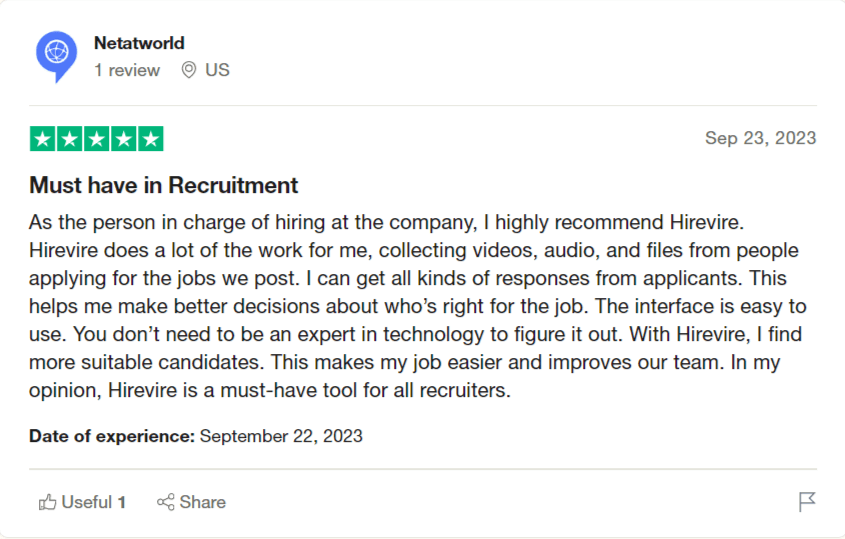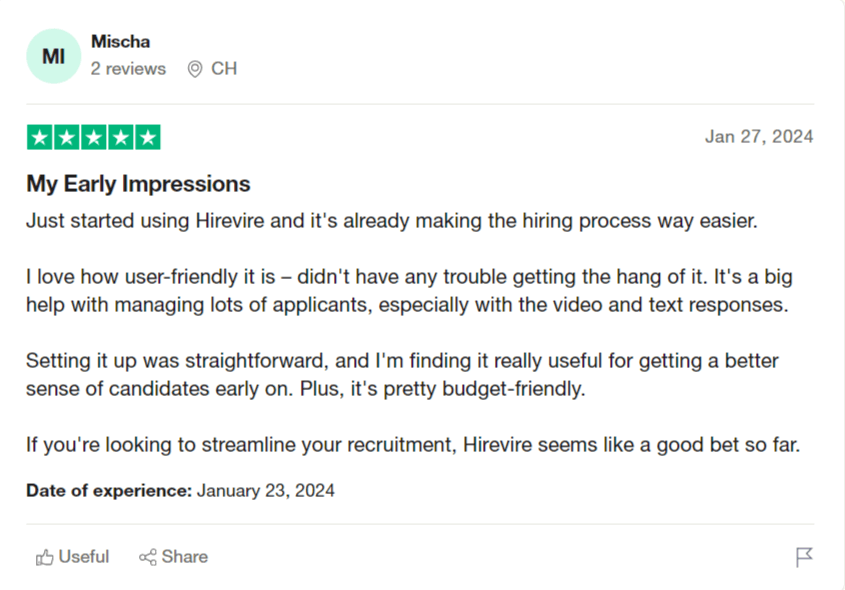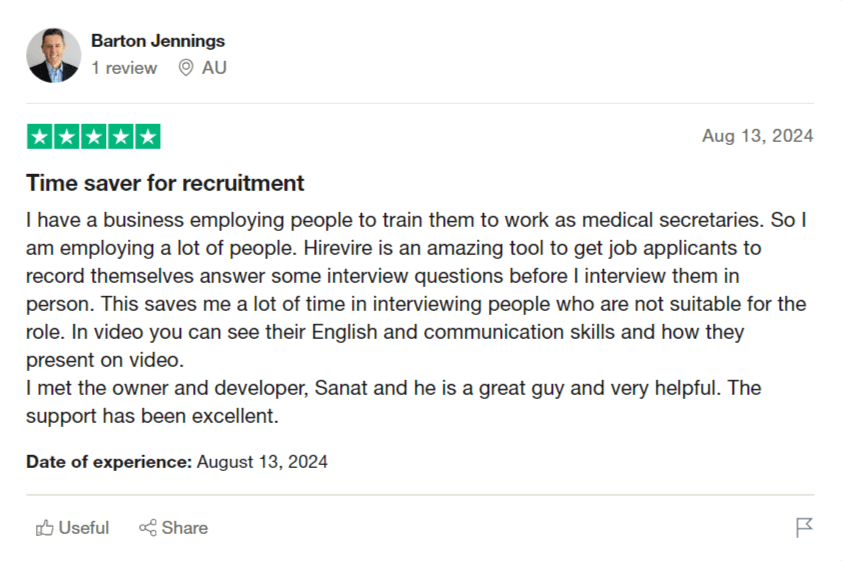15 Essential Screening Interview Questions to Identify Top-Tier Talent

In today's job market, finding and hiring top talent is more important than ever.
As we move through 2024, industries like technology, healthcare, and renewable energy are growing fast, making it harder to find skilled professionals.
To keep up, it's time to improve your hiring process, starting with better screening interview questions.
Good screening questions are key to a successful hiring process.
They help you quickly filter out candidates, so only the best move forward.
This saves you time and money while increasing your chances of hiring people who will push your company forward.
In this article, we'll cover 15 powerful screening interview questions to help you find top candidates.
Plus, we'll introduce Hirevire's platform, which makes it easier to screen lots of candidates at once.
Our technology helps you handle hundreds or even thousands of candidates, making your recruitment process faster and more efficient.
By the end of this article, you'll have a strong set of questions and know how Hirevire can boost your hiring.
Let's get started and find your next game-changing team member.
The Critical Role of Screening Interviews in Modern Recruitment
In an era where talent acquisition can make or break a company's success, screening interviews have become more than just a preliminary step—they're a strategic necessity.
As the job market continues to evolve, with remote work becoming mainstream and skill requirements rapidly changing, your ability to quickly assess candidates' potential fit is paramount.
Effective screening questions serve multiple purposes:
- They filter out unqualified or mismatched candidates early in the process.
- They provide insights into a candidate's skills, experience, and cultural fit.
- They help you allocate your time and resources to the most promising prospects.
- They set the stage for more in-depth conversations in subsequent interview rounds.
However, crafting the right screening questions is an art.
It would help if you struck a balance between gathering essential information and avoiding potential biases or legal pitfalls.
It's crucial to frame questions that are not only insightful but also fair and compliant with employment laws.
With that in mind, let's explore 15 carefully curated screening interview questions that will help you identify top-tier talent efficiently and effectively.
15 Powerful Screening Interview Questions to Elevate Your Hiring Process
-
"What inspired you to apply for this position, and what do you know about our company's mission?"
This question gauges the candidate's genuine interest in the role and their initiative in researching your company.
Look for answers that demonstrate alignment between their career goals and your organization's values.
-
"Can you walk me through a recent project where you had to overcome significant obstacles? What was your approach?"
This behavioral question reveals problem-solving skills, resilience, and the candidate's ability to articulate complex situations clearly.
-
"How do you stay updated with the latest trends and developments in your field?"
This query helps you assess the candidate's commitment to continuous learning and professional growth—essential traits in rapidly evolving industries.
-
"Describe a time when you had to work with a diverse team. How did you ensure effective collaboration?"
This question explores the candidate's interpersonal skills, cultural competence, and ability to thrive in diverse work environments.
-
"What's your experience with [specific technology or methodology relevant to the role]?"
Tailor this question to your industry to quickly assess technical competencies and hands-on experience.
-
"If you were to start in this role tomorrow, what would be your strategy for the first 30 days?"
This question assesses the candidate's ability to plan, prioritize, and take initiative.
It also reveals their understanding of the role and how they might approach onboarding.
-
"Tell me about a time when you received critical feedback. How did you respond, and what did you learn?"
This query helps evaluate the candidate's ability to handle constructive criticism, their self-awareness, and their capacity for growth and improvement.
-
"How do you manage your time and prioritize tasks when working on multiple projects simultaneously?"
This question provides insight into the candidate's organizational skills, ability to multitask, and their approach to time management under pressure.
-
"Describe a situation where you had to explain a complex concept to someone with little background knowledge. How did you ensure they understood?"
This explores the candidate's communication skills, patience, and ability to break down complex ideas—crucial for many roles, especially those involving client interaction or team leadership.
-
"What's the most innovative idea you've implemented in your previous roles? How did you bring it to fruition?"
This question helps gauge the candidate's creativity, initiative, and ability to drive innovation within an organization.
-
"How do you handle situations where you disagree with a superior's decision?"
This query assesses the candidate's ability to navigate workplace dynamics, their respect for authority, and their skills in diplomatic communication.
-
"Can you share an example of how you've contributed to improving a process or increasing efficiency in a previous role?"
This question helps identify candidates who are proactive in seeking improvements and can add value beyond their basic job description.
-
"What's your approach to building and maintaining professional relationships with colleagues and clients?"
This explores the candidate's interpersonal skills, networking abilities, and understanding of the importance of professional relationships in business success.
-
"Describe a situation where you had to adapt quickly to a major change in your work environment. How did you manage it?"
This question assesses the candidate's flexibility, adaptability, and resilience—crucial traits in today's fast-paced business world.
-
"If you could choose one skill to master that would make you more effective in this role, what would it be and why?"
This final question reveals the candidate's self-awareness, their understanding of the role's requirements, and their commitment to personal and professional development.
Read more: 7 Best One-Way Recruiting Software You Should Know In 2024
Maximizing the Impact of Your Screening Questions
While having a robust set of questions is crucial, the way you implement them can significantly affect their effectiveness. Here are some best practices to ensure you get the most out of your screening process:
- Customize for the role: Tailor your questions to the specific position you're hiring for. While some questions may be universal, others should directly relate to the skills and experiences most relevant to the job.
- Be consistent: Ask all candidates for a particular role the same core questions. This ensures fairness and allows for easier comparison between applicants.
- Listen actively: Pay attention not just to what candidates say, but how they say it. Their tone, enthusiasm, and ability to articulate thoughts can be just as revealing as the content of their answers.
- Follow-up: If a candidate's response is vague or leaves you wanting more information, don't hesitate to ask follow-up questions. This can help you dig deeper into their experiences and thought processes.
- Take notes: Document key points from each candidate's responses. This will help you remember specific details when it's time to make decisions about who moves forward in the process.
- Be mindful of time: While it's important to be thorough, remember that screening interviews should be relatively brief. Aim to keep them between 15-30 minutes.
- Provide context: Give candidates a brief overview of the role and company at the beginning of the interview. This sets the stage for more informed responses.
By following these guidelines, you'll be able to conduct more effective screening interviews that truly help you identify the best candidates for your organization.
Transform Your Hiring with Hirevire
At Hirevire, we understand that time is of the essence in today's competitive job market.
That's why we've developed a cutting-edge platform that revolutionizes the screening process, allowing you to evaluate hundreds or even thousands of candidates simultaneously.
What Our Clients Say



Key Benefits
- Time Savings: Reduce screening time by up to 75%
- Improved Quality: Our AI-powered analysis helps you identify top candidates more accurately
- Consistency: Ensure a standardized screening process for all applicants
- Flexibility: Conduct screenings anytime, anywhere, accommodating both recruiters' and candidates' schedules
- Data-Driven Decisions: Gain valuable insights through our comprehensive analytics dashboard
The Numbers Speak for Themselves
- 93% of our clients report a significant improvement in their hiring process efficiency
- On average, companies using Hirevire see a 40% reduction in cost-per-hire
- 89% of candidates report a positive experience with our user-friendly platform
Don't let top talent slip through your fingers. Experience the Hirevire difference today and take your hiring process to the next level.
Now that you've seen the power of strategic screening questions and the game-changing potential of Hirevire, it's time to take action. Our platform seamlessly integrates these questions into a streamlined, efficient process that will revolutionize your hiring approach.